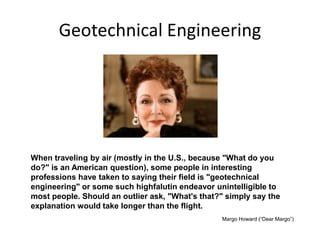Some Known Facts About Geotheta.
Wiki Article
Examine This Report about Geotheta
Table of Contents10 Simple Techniques For GeothetaThe Single Strategy To Use For GeothetaGeotheta for BeginnersGeotheta - Truths
They collaborate with civil designers, structural engineers, engineers, and various other specialists to integrate geotechnical factors to consider right into the overall project layout and building process. This calls for efficient teamwork, control, and communication to ensure that the geotechnical facets line up with the task goals and meet regulative requirements.Mining & Products Engineering: Concepts of boring, infiltration prices, and elements affecting the option of exploration method. Characteristics of nitroglycerins, firing systems and blast patterns. Blowing up techniques in surface area and underground functions. Unique blasting methods at excavation perimeters. Vibration and sound control. Mechanical and continuous strategies to fragmentation, consisting of longwall shearing and fullface boring.
Modelling of fragment and bit dimension circulations; comminution as a transfer function. Comminution innovation: squashing, grinding, dimension category. Integrated evaluation of fragmentation and comminution procedures. Provided by: Mining & Materials Design.
Not known Details About Geotheta
Bachelor's level programs in civil, geotechnical, geological, and ecological design typically last four years and consist of basic education courses in English, social scientific research, and the humanities, as well as courses in advanced maths, architectural geology, and liquid mineralogy. (https://disqus.com/by/geotheta/about/)Geotechnical design entails the assessment of the soil and rock conditions at a specific website, and their effects for the growth of that website. As most structures rely on the ground for support, it is without shock that an in-depth understanding of the ground problems, and the viability of structure systems, are important to the lasting security and efficiency of the structure or structure.
Specialising in the investigation of geological formations and ground behaviour, geotechnical engineers carry out scientific investigations and testing to comprehend the effect these geological formations may have on the design and construction of building, civil and framework projects. This expertise is essential for the design and construction of buildings, roadways, passages, dams, bridges, and water system and sewer system.
The geotechnical team at Douglas Partners routinely seek advice from engineers, style designers, designers, and home builders to make suggestions on style and development propositions to make certain that the developed structures are appropriately made for the ground problems. As an example, the design of footing systems requires to think about the weight of the structure, the ability of the ground to sustain that weight along with activity tolerances and efficient building and construction.
5 Easy Facts About Geotheta Explained
This task is greatly simplified by the use our Douglas Map geospatial platform that makes this information easily accessible in a simple to make use of web internet browser user interface. A geotechnical engineer will route the drilling of boreholes and test pits to collect dirt and various other samples, and likewise assess surface functions and ground direct exposures to form a geotechnical design of the subsurface problems.Relying on the project kind and ground problems ran into, laboratory testing may amongst various other points assess stamina, compressibility, sensitivity and/or leaks in the structure of dirt and rock samples. After this information is accumulated and looked at, the outcomes are used for a geotechnical model of the site, which is normally offered as areas throughout the website.

A geotechnical examination by nature can just examine the ground problems at the places drilled or excavated. Natural variations in soil and rock conditions can happen across a site and between test locations. It is therefore good practice that the geotechnical designer be maintained throughout construction of the task to give on-site confirmation that the ground problems come across follow the assumptions and advice supplied in the geotechnical examination record.
All About Geotheta
Geotechnical engineers utilize their thorough knowledge of dirt and rock to evaluate risk and address issues on diverse facilities projectsGeotechnical engineering is a specialist branch of civil engineering which takes a look at the practices of planet materials and the application of dirt and rock technicians. Geo Tech Engineering. As a geotechnical designer, you will assess the physical, mechanical and chemical buildings of soil and rock in order to make foundations, preserving structures and earthworksGeotechnical design is closely linked to and read review overlaps with, both design geology and ground engineering - https://packersmovers.activeboard.com/t67151553/how-to-connect-canon-mg3620-printer-to-computer/?ts=1722609175&direction=prev&page=last#lastPostAnchor. It's possible to be experts in geotechnics or help a geotechnical business but be referred to as a design rock hound or a ground engineer. As a geotechnical engineer, you'll require to: build and keep connections with clients and various other experts involved in the website, throughout each projectmaintain security standards on website be mindful of cost effects when you make recommendationsstudy geological maps and aerial pictures from a variety of sources and from various time periodsexamine building intends to see exactly how feasible they are based upon your understanding of the siteinvestigate risks or geological threats for the sitesearch for ecologically delicate attributes, such as landfill begin to develop valid and interpretive ground modelsplan area investigationsdrill and analyse examples of bedrock, soil, groundwater and extra products oversee other experts on sitesolve technological problems as they emerge, such as unforeseen frameworks at drill sitesmonitor conditions throughout and after construction to ensure frameworks are stable in the brief and lengthy termadding data gathered on website to your first researchcreating geotechnical calculations, illustrations, and 2 or three-dimensional computer designs analyzing the datamaking recommendations regarding the recommended use of the site

Report this wiki page